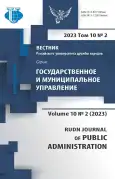The Problem of the «Sovereign Internet» in Russia
- Авторлар: Stepanov S.A.1, Ivanova E.A.1
-
Мекемелер:
- RUDN University
- Шығарылым: Том 10, № 2 (2023)
- Беттер: 195-209
- Бөлім: CURRENT PROBLEMS OF PUBLIC ADMINISTRATION
- URL: https://journal-vniispk.ru/2312-8313/article/view/317985
- DOI: https://doi.org/10.22363/2312-8313-2023-10-2-195-209
- EDN: https://elibrary.ru/GMTGLB
- ID: 317985
Дәйексөз келтіру
Толық мәтін
Аннотация
The article is devoted to the problem of sovereignty of the Russian segment of the global Internet. The hypothesis of the study is that the Russian government intends to take control of the dissemination of information via the Internet, but this intention runs counter to the economic interests and objectives of the modernization of the country based on modern technologies. In this regard, the actions of the Russian authorities in this area are contradictory and half-hearted. Attempts to control the information space, social networks and video blogs are increasingly on the agenda in many states. At the dawn of its existence, the Russian segment of the Internet was practically free from censorship and from any interference from the state in general. Each user was free to express his personal opinion without fear of censorship. It should be recognized that complete freedom has not always been for the good. There were websites on the Runet that freely spread neo-Nazi, chauvinistic, xenophobic views. As the confl with the West deepened, the idea of protecting the Runet from hostile ideological infl following the example of China, was increasingly discussed in Russian government circles. Currently, the Runet, despite increased censorship, is still an integral part of the Internet. The fi part of the article is devoted to the analysis and comparison of the degree of control of social networks in diff countries and come to logical conclusions.
Негізгі сөздер
Авторлар туралы
Sergey Stepanov
RUDN University
Хат алмасуға жауапты Автор.
Email: stepanov-sa@rudn.ru
ORCID iD: 0000-0003-4682-0445
Doctor of Historical Sciences, Full Professor of the Department of Public Policy and History of State and Law
6 Miklukho-Maklaya str., Moscow, Russian Federation, 117198Ekaterina Ivanova
RUDN University
Email: ivanova-eka@rudn.ru
ORCID iD: 0000-0001-7350-6123
PhD in Political Sciences, Associate Professor of the Department of Public Policy and History of State and Law
6 Miklukho-Maklaya str., Moscow, Russian Federation, 117198Әдебиет тізімі
- Toffler E. Tret’ ja volna [The Third Wave]. Moscow: Publishing house “AST”; 1999: 6–261 (In Russ.).
- Webster F. Teorii informacionnogo obshhestva [Theories of Information Society]. Moscow: Aspect Press; 2004. 400 p. (In Russ.).
- Castels M. Galaktika Internet: razmyshlenija ob Internete, biznese i obshhestve [Galactica Internet: Reflections on the Internet, Business and Society]. Yekaterinburg: U-Factoriya, 2004. 328 p. (In Russ.).
- Masuda E. Informacionnoe obshhestvo kak postindustrial’noe obshhestvo [Information Society as a Post-industrial Society]. Moscow: Academy; 1997 (In Russ.).
- Volodenkov S.V. Digital-tehnologii v sisteme tradicionnyh institutov vlasti: politicheskij potencial i sovremennye vyzovy [Digital Technologies in the System of Traditional Institutions of Power: Political Potential and Modern Challenges]. Bulletin of the Moscow State University. 2018;2:39–48 (In Russ.).
- Lavrov I.A., Sokol A.V. Rossijskaja vlast’ i Internet: bezopasnost’ protiv svobody slova [Russian Power and the Internet: Security Against Freedom of Speech]. Digital Sociology. 2019;2:12–24 (In Russ.).
- We Are Social. Digital aroundthe World 2023. URL: https://wearesocial.com/us/blog/2023/01/digital-2023/ (accessed: 06.04.2023).
- Omelichkin O.V. Jelektronnaja demokratija: ponjatie, problem [Electronic democracy: concept, problems]. Bulletin of KemSU. 2014; 1 (57): 86–89 (In Russ.).
- Lee A. What is China’s Social Credit System and Why Is It Controversial? South China Morning. 09.08.2020 URL: https://www.scmp.com/economy/china-economy/article/3096090/what-chinas-social-credit-system-and-why-it-controversial (accessed: 10.03.2023).
- Nunez M. Former Facebook Workers: “We Routinely Suppressed Conservative News”. Gizmodo. 05.06.2016. URL: https://gizmodo.com/former-facebook-workers-we-routinelysuppressed-conser-1775461006 (accessed: 06.04.2022).
- Cherkashin P. Kak Facebook menyaet svoyu politiku i mozhno li e`to nazvat` cenzuroj [How Facebook Changes Its Policy and Can It Be Called Censorship]. Forbes. 10.11.2020. URL: https://www.forbes.ru/tehnologii/413423-kak-facebook-menyaet-svoyu-politiku-i-mozhno-li-etonazvat-cenzuroy (accessed: 10.03.2023).
- Klishas A. Zachem nuzhen zakon ob ustojchivosti Runeta [Why Do We Need a Law on the Stability of the Runet]. Parlamentskaya gazeta. 12.02.2021. URL: https://www.pnp.ru/politics/zachem-nuzhen-zakon-ob-ustoychivosti-runeta.html (accessed: 10.03.2023) (In Russ.).
- “Chto Putin govoril ob internete i ego sud`be v Rossii” [What Putin Said about the Internet and Its Fate in Russia]. BBC News Russkaya sluzhba. 21.02.2019. URL: https://www.bbc.com/ russian/news-47317481 (accessed: 10.03.2023) (In Russ.).
- SMI Rossii: e`ksperty` predupredili o riskax «suverennogo interneta [Russian Mass Media: Experts Warned about the Risks of a “Sovereign Internet”]. BBC News Russkaya sluzhba. 12.10.2021. URL: https://www.bbc.com/russian/features-46678564 (accessed: 10.03.2023) (In Russ.).
- LinkedIn sohranil 60 % pol`zovatelej v Rossii posle goda blokirovki [LinkedIn Has Retained 60 % of Users in Russia after a Year of Blocking]. RBK Post. 16.11.2017. URL: https://www.rbc.ru/technology_and_media/16/11/2017/5a0c0bbd9a7947de35a7e886 (accessed: 10.12.2021) (In Russ.).
- «O messenzhdere Telegramm» [About the Telegram Messenger]. Federal`naya sluzhba po nadzoru v sere svyazi informacionny`x texnologij i massovy`x kommunikacij. 18.06.2020. URL: https://rkn.gov.ru/news/rsoc/news73050.htm (accessed: 10.03.2022) (In Russ.).
- Durov: «Ya zadumalsya o svoyom budushhem v Rossii, kogda k dveri prishyol specznaz» [Durov: “I was Thinking about My Future in Russia When the Special Forces Came to the Door”]. URL: https://tjournal.ru/tech/53264-durov-for-nyt (accessed: 10.03.2023) (In Russ.).
- Poteri biznesa ot blokirovki Telegram ocenili v $2 mlrd i drugie novosti e`togo utra [Business Losses from Telegram Blocking Were Estimated at $2 Billion and Other News This Morning]. RIA Novosti. 03.03.2020. URL: https://republic.ru/posts/90618 (accessed: 10.03.2022) (In Russ.).
- «Telegram vpervy`e obognal WhatsApp po ob``emu trafika sredi abonentov «MegaFona» [Telegram Overtook WhatsApp for the First Time in Terms of Traffic Volume among MegaFon Subscribers]. «Kommersant». 21.03.2022. URL: https://www.kommersant.ru/doc/5269777 (accessed: 10.03.2022) (In Russ.).
- Nogaeva K. «Glupost` absolyutno bespoleznaya»: blokirovka Twitter v Rossii [“Absolutely Useless Stupidity”: Blocking Twitter in Russia]. Delovoj Peterburg. 16.03.2021. URL: https://www.dp.ru/a/2021/03/16/Glupost__absoljutno_besp (accessed: 10.03.2023) (In Russ.).
- V Gosdume ocenili vozmozhnost` blokirovki YouTube [The State Duma Assessed the Possibility of Blocking YouTube]. Izvestiya. 29.09.2021. URL: https://iz.ru/1228441/202109-29/v-gosdume-otcenili-vozmozhnost-blokirovki-youtube-v-rossii (accessed: 06.04.2023) (In Russ.).
- Gajnutdinov D. Praviladlyachuzhix: pochemurastetveroyatnost` blokirovki YouTube i Facebook [Rules for Strangers: Why the Probability of Blocking YouTube and Facebook Is Growing]. Forbes. 19.03.2021. URL: https://www.forbes.ru/obshchestvo/423987-pravila-dlya-chuzhihpochemu-rastet-veroyatnost-blokirovki-youtube-i-facebook (accessed: 10.03.2023) (In Russ.).
Қосымша файлдар










